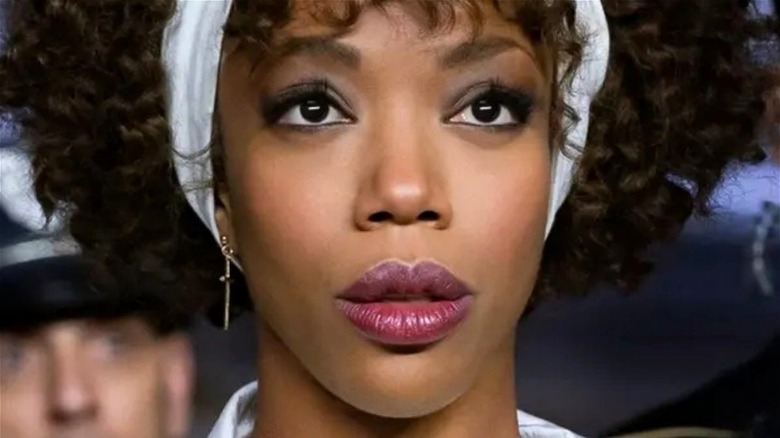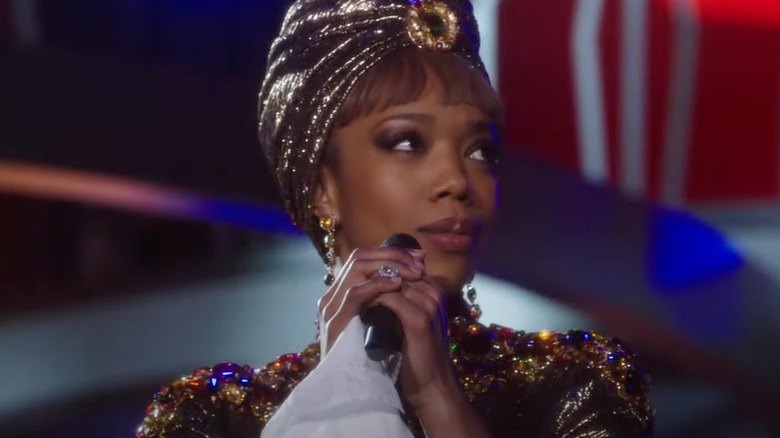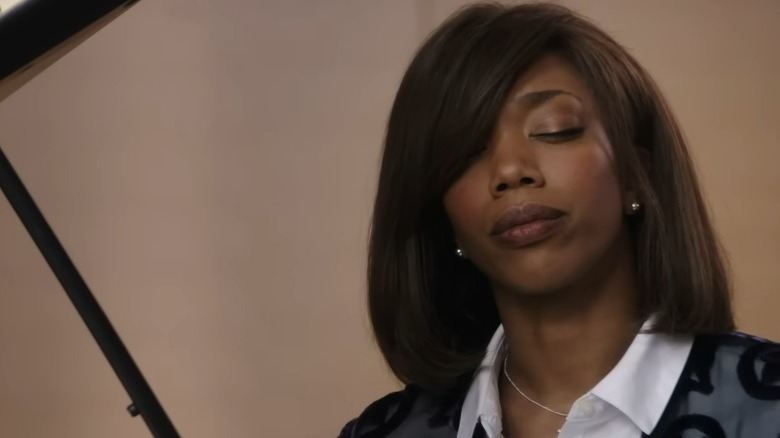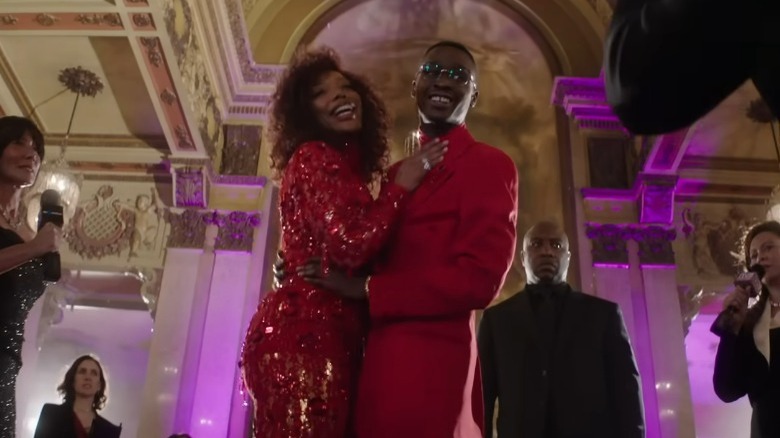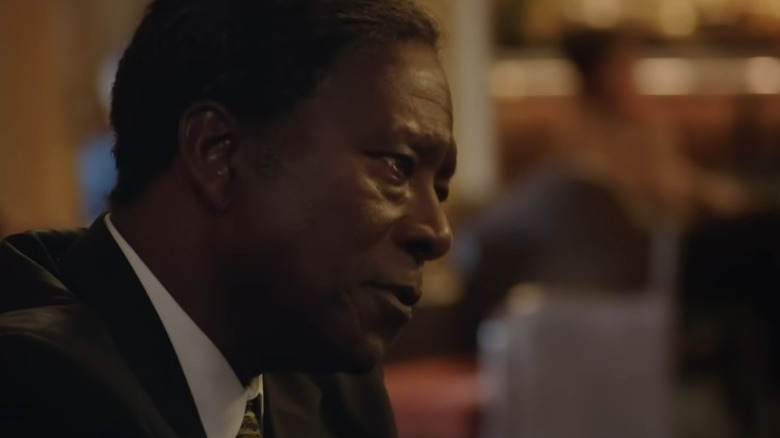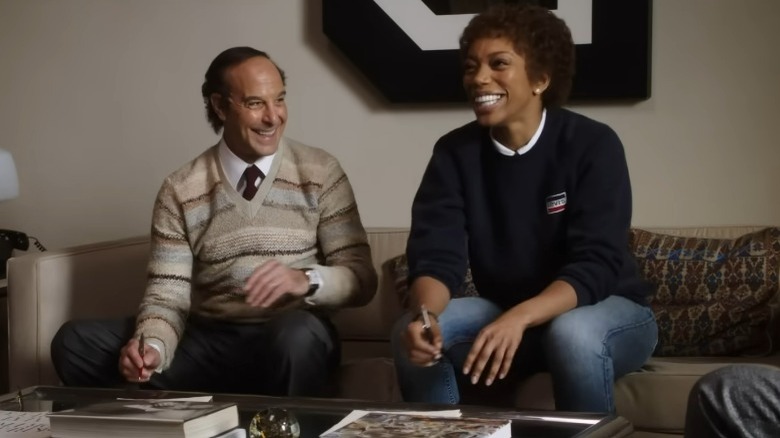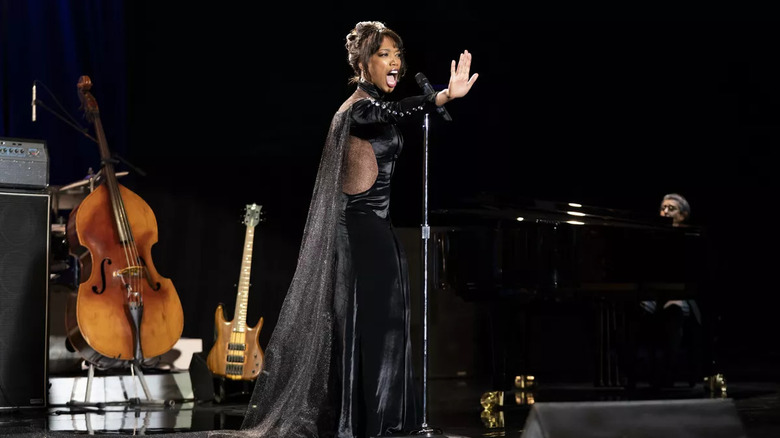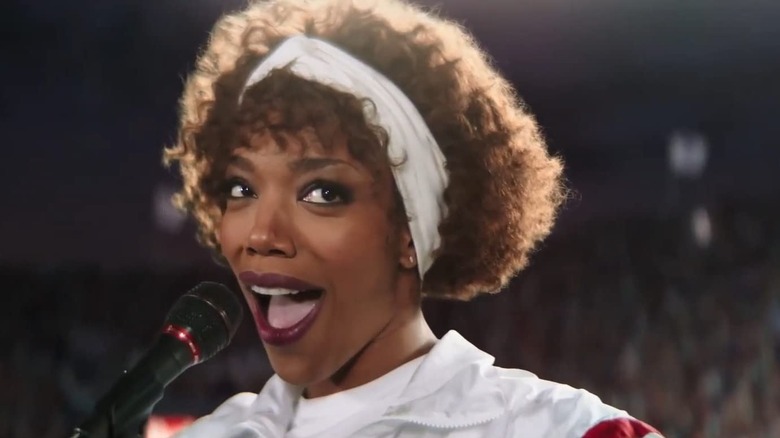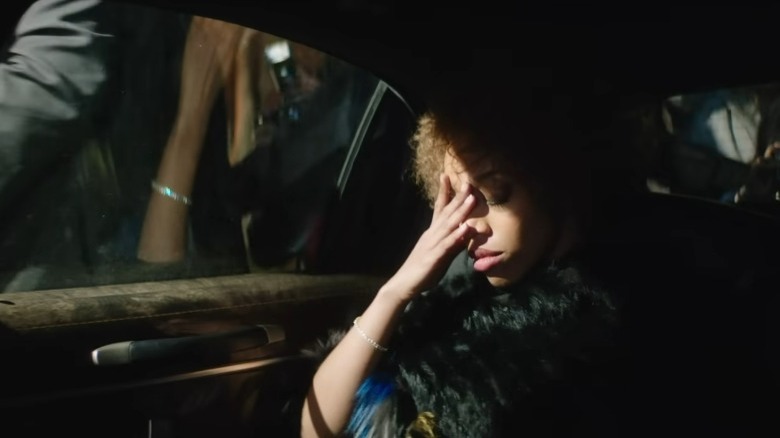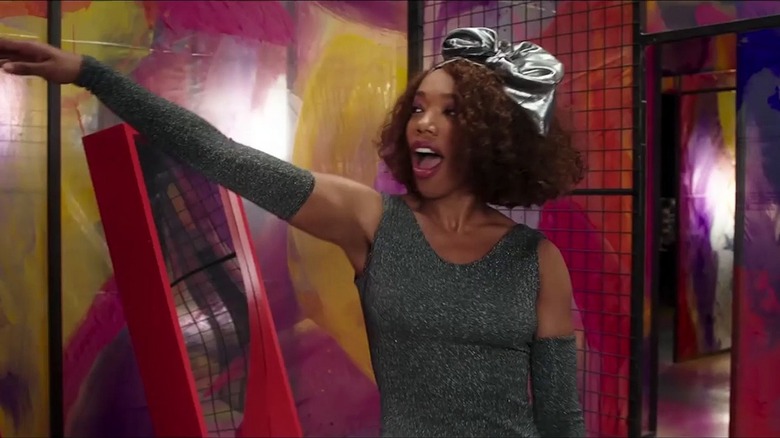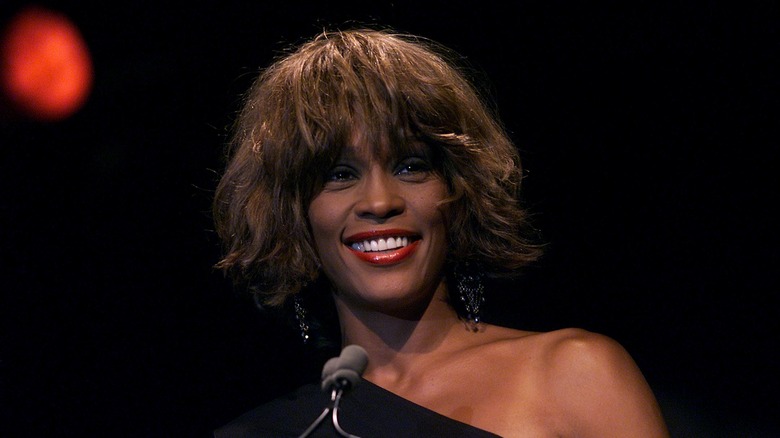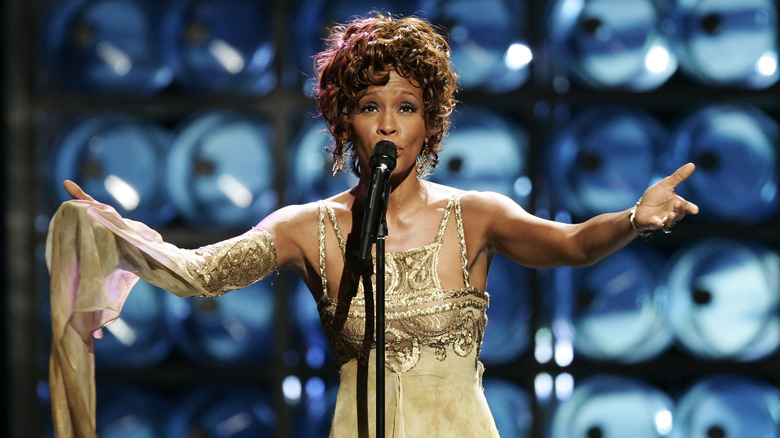The Ending Of I Wanna Dance With Somebody Explained
Director Kasi Lemmons brings the music, life, and incredible voice of the legendary singer Whitney Houston to life with the new biopic "I Wanna Dance with Somebody." The film depicts the life and career of iconic singer Whitney Houston, played by Naomi Ackie, and tackles her illustrious highs and devastating lows. From the start of her career working alongside record producer Clive Davis (Stanley Tucci) to her eventual relationship with R&B singer Bobby Brown (Ashton Sanders), the film touches on nearly every part of Houston's time in the public eye.
Ackie's performance as Houston evokes the energy and charisma that gave the performer such an excellent stage presence, and the song sequences utilized are both nostalgic and fitting for the big screen. However, the film isn't afraid to touch on the darker parts of Houston's personal life, including her eventual drug addiction and tumultuous personal relationships. Houston's low points are definitely where the film is at its most emotional and contain some truly gut-wrenching moments.
Everything leading to those final moments tugs at your heart and is worth looking over to understand the complete picture of the film's depiction of Houston's final years before her tragic death in 2012. As such, we're going to delve into everything shown in the big final moments of "I Wanna Dance with Somebody."
The origins of Whitney's addiction
Although Whitney's drug use worsens in later parts of her life, there are moments early on when she begins to use drugs as an escape route. While she and Robyn (Nafessa Williams) are first shown to use cannabis from time to time, there are some later scenes that introduce Whitney's use of heavier drugs as a way to escape newfound stressors. It would be easy to say that the pressures of stardom spur her drug use, but issues in her personal life seemed to be a stronger influence on her drug use — and abuse.
Her father and manager John (Clarke Peters) constantly adds new stress to Whitney's life with his misuse of her finances and efforts to control her image. Not only does he force Whitney to show a specific persona for herself, but he also causes rifts in her relationship with Robyn because he disapproves of them spending time together. Beyond that, Whitney's toxic relationship with Bobby causes her to constantly look for an escape — or, as she refers to it, a vacation.
Whitney's addiction is constantly elevated as pressures grow from those around her and as control over her life is ripped away.
If you or anyone you know needs help with addiction issues, help is available. Visit the Substance Abuse and Mental Health Services Administration website or contact SAMHSA's National Helpline at 1-800-662-HELP (4357).
Harsh critics
Whitney faces immense criticism throughout her career regarding both her professional and personal life. When her songs start to climb the charts and even earn some award recognition, Whitney is criticized by some who claim her music is not being "black enough." Beyond that, she is repeatedly labeled as a sellout. The criticism surrounding her race gets so bad that she often dealt with rebukes at performances and events where protestors shout derogatory names.
As Whitney and Bobby's relationship becomes more conflict-filled, they are increasingly targeted by tabloids. Pretty much any time that Bobby ends up on the front page for some "bad boy antics" Whitney is quickly pulled in as well, making them a controversial couple in the public eye. Most notable, however, is the harsh criticism Whitney receives when her drug use starts to affect her singing — eventually threatening her iconic vocal range.
The bad reviews Whitney receives from her comeback performance impact her reputation at the time and demonstrate how drug use negatively affects her career. While Whitney Houston is still rightfully seen as one of the greatest singers of all time, that certainly doesn't mean she didn't face her share of critics, which the film highlights as it barrels towards its tragic finale.
Whitney and Bobby
While the film delves into the highs and lows of Whitney's career, it also showcases how Whitney and Bobby's relationship began. Since Whitney's father doesn't want her to date Robyn publicly, she begins to explore relationships with men, and she eventually meets Bobby at an awards show. After dealing with some protestors outside the show, Whitney is emotional. While she has plenty of support from Robyn and her family, Whitney remains in an emotionally vulnerable state.
When Bobby turns around and tries to comfort Whitney during the ceremony, it makes a real impact on her. She gives Bobby her business card with a personal message on it, and it's not too long until they start dating — eventually becoming the king and queen of R&B. Although their relationship would eventually become consumed with conflict and end in separation, there's something special about seeing their first interaction on-screen. In all honesty, it's tough to blame Whitney for being smitten by Bobby's good gesture.
Love lost
It's no secret that Whitney and Bobby's relationship was far from stable. As depicted in the film, it eventually takes some nasty turns. Bobby's cheating causes some major fractures in the bond that they share, and an overriding sense of mistrust follows them into their marriage. While there are still some loving moments surrounding the birth of their daughter and Whitney's continued success as a singer, their relationship is never without its problems — with Bobby's controlling behavior seemingly at the center of most of them.
When Whitney's drug addiction is at its worst, Bobby rarely offers any pathway to recovery and often acts as more of an obstacle. He is a major wedge in Whitney's relationship with Robyn and influences her spiral into excessive drug use. Further, their arguments would come off so vicious at times that viewers can't help but feel on edge seeing them depicted on-screen. As such, when Whitney finally decides to go through rehab, she ends up choosing to leave Bobby, which gives her a chance for a truly fresh start.
While Whitney and Bobby's romance was a major staple of pop culture, it was far from perfect and contributed to some of the difficulties the singer encountered after she became a star.
A challenging relationship with her father
Whitney's relationship with her father John is just as dysfunctional as the one with her husband and also ends on a dour note. Although John is a pivotal figure for Whitney growing up since he mostly takes care of her while her mother, Cissy (Tamara Tunie), is on tour, their relationship quickly becomes complicated after he begins acting as her manager. When Whitney approaches him about including Robyn in her career, he instantly shuts it down and shows his disdain toward Robyn. John also instantly starts digging into Whitney's money by providing all his assistants with charge cards. Their misuse of those cards — and Whitney's money — eventually gets so bad that Whitney nearly goes broke.
Any time Whitney tries to confront her father about his behavior, he digs his heels in further and puts Whitney in a complicated position. Even when Whitney feels betrayed by him, she still loves him as her father and struggles to truly cut him off. This complex dynamic is what makes their final moment together in the hospital so tragic, as Whitney's complicated feelings toward him don't allow for much closure. It's so bad that Whitney even opts not to attend his funeral and instead goes into a drug-fueled spiral.
While Whitney still has loving feelings for her father, it's tough for her not to resent him for his underhanded actions and for trying to control her life.
A helping hand
Although Whitney has many toxic men in her life, her producer Clive is thankfully not one of them. While he wants to keep their relationship strictly professional, Clive generally acts as a genuine lifeline to Whitney and proves to be one of the few people who the singer can actually trust. Almost any time that Whitney hits a rough patch and is at a mental breaking point she could go to Clive to get back to a better mindset. Sometimes her visits to Clive even result in the creation of her most iconic songs. As such, when Whitney's drug use starts to damage her life, Clive decides to step in.
After inviting Whitney and her daughter over to his house, Clive breaks his one rule with clients to confront Whitney about her drug use. It's a surprisingly tender moment that sees Whitney shed tears and Clive act the most personable that we see him in the film.
It's a small but meaningful moment of intervention that shows how much Whitney means to Clive as a person — not just as a client. Although Clive states that he stays out of his clients' personal matters, Whitney is someone who clearly means something more to him.
A falling out with a friend
At the start of the film, we see that Whitney develops a strong friendship with Robyn that turns into something more. Their bond feels seemingly unbreakable as Robyn is a positive support system for Whitney that allows her to stay true to herself. Even after their big blowup, which stems from Whitney hooking up with Jermaine Jackson (Jaison Hunter), their genuine connection keeps them together for years. However, they face heavy opposition that ultimately causes a deep rift to develop between them.
Whitney's father heavily disapproves of their relationship from the start and even directs them to pursue romantic interactions with men to hide the true nature of their connection. Once Bobby enters the picture, he also impedes their friendship at nearly every turn and tries to push Robyn out of Whitney's life. By the time Whitney's drug use and exhausting performance regimen have become a real issue, Robyn is fed up with how Whitney won't take charge of her own life.
She ultimately decides to distance herself from Whitney, which leaves the troubled performer without someone to steer her toward the path of recovery. Whitney and Robyn's relationship is one of the warmest elements of the early parts of the film, so it's devastating to see their friendship ruined by outside forces.
Whitney's identity crisis
Since many of Whitney's image and life choices are seemingly out of her control throughout the film, her story can definitely feel like a cautionary tale of losing yourself. From the first moments of her career, Whitney is essentially forced into a box that slowly starts to eat away at who she is. She is forced to keep her relationship with Robyn in the shadows and faces intense criticism over her music, which leads to her confronting the impact of her persona.
Even once she is married to Bobby, Whitney continues to feel like her life was simply out of her hands. Her inability to control Bobby's dysfunctional behavior further spurs her drug use. Her performances start to reflect how she feels trapped by others. It's not until she goes through rehab and begins preparing for her special performance that Whitney realizes how much her personal identity has slipped away from her.
Unfortunately, this comes too late and Whitney succumbs to the pressures that have caused her so much pain throughout the years. If there's any takeaway from Whitney's story, it's that maintaining your self-control and identity is immensely important.
A secret supplier
Throughout the film, you can't help but wonder how Whitney is getting access to the drugs that are tearing her life apart. After all, she is constantly in the public eye. However, in a small but noteworthy scene, the film gives this question an answer — and it's pretty surprising.
Early in the film, Whitney is seen going through a crowd of paparazzi and fans but only signing one fan's notebook before heading into her limo. The camera lingers on the fan, and you're left wondering what the importance of this shot is supposed to be. Later on, however, Whitney sees this same fan again and gives them another autograph — but when this happens again, the real nature of this interaction is shown.
It turns out that this fan is a drug dealer who hides narcotics in the pen Whitney writes with. She then slips the drugs away while leaving cash in the notebook. It's an interesting reveal that shows Whitney relapsing and how she was able to keep her drug use relatively under wraps.
The performance of a lifetime
Although Houston's life ended with her tragic death in 2012, the film decides to end on a more triumphant note. Rather than focus on her passing, the film flashes back to the 1994 American Music Awards, where Houston performed her iconic medley featuring the songs "I Loves You, Porgy" from the 1935 opera "Porgy and Bess," "And I Am Telling You I'm Not Going" from the 1981 Broadway musical "Dreamgirls," and Houston's original composition "I Have Nothing." It's a powerful ending that solidifies Houston as a one-of-a-kind talent and leaves things on a hopeful note. So why does the film end with this performance?
Well, for starters, it's pretty fitting given that Whitney was just reminded of this performance by a bartender, played by rising director Elegance Bratton. Plus, she finds herself at a significant crossroads in her life. She's on the verge of a relapse and is worried that her legacy is tarnished because her vocal range is not the same anymore.
As such, it makes sense for Whitney to think back on this moment, and letting the audience watch this entire performance play out fits well with the note that the closing moments of the film leave you on. While the film's ending doesn't carry the full weight of Whitney's tragic death, it does capture the incredible talent and charisma she boasted — which is ultimately what most people remember her for.
A tragic end, but a prominent legacy
Although the film ends with a triumphant moment for Whitney by depicting her iconic medley performance at the American Music Awards, it doesn't completely gloss over her tragic death. Using a few ending credit slates, the film talks about Whitney's tragic death from drowning in her bathtub due to an accidental drug overdose after she traveled to Los Angeles for the 2012 Grammy Awards. The added line of her dying at the age of 48 certainly leaves a gut punch right before the final credits, but the film also acknowledges the impact and legacy she left behind.
Through some more quick lines, the film touches on Whitney's many achievements in entertainment, including being one of the most decorated singers of all time. To this day, Whitney remains the best-selling Black artist of all time and holds records in the music industry that have yet to be broken. She has even earned a posthumous induction into the Rock & Roll Hall of Fame and continues to serve as an inspiration for a new generation of performers. While Whitney's death absolutely shocked the world and left a huge hole in the hearts of fans across the globe, her legacy still leaves a massive impact.
Does I Wanna Dance with Somebody add to the legacy of Whitney Houston?
Biopics always add something new to the legacy of their subjects and that can easily be said about "I Wanna Dance with Somebody." That said, many critics found that the film is more of a compilation of Houston's greatest hits rather than a deep dive into her life and legacy. However, that doesn't mean that the film doesn't act as a valid celebration of the enormous impact that Houston had on the world. It offers plenty of nostalgia for fans of her music, while Naomi Ackie does a great job evoking Houston's personality and genuine love of music.
At the very least, "I Wanna Dance with Somebody" is a great way for fans to reminisce on the impact that Houston had on them and makes for a music-filled emotional journey down memory lane. There's certainly some fair debate to be had about the film's depiction of critical events in Houston's life and a possible lack of depth, but the film at least adds to Houston's legacy by carrying on her story and demonstrating her signature voice — a voice that remains in a league of its own.
